In this blog, we’ll explore the Marine Battery Group Size Chart.
Boats require substantial power, and marine batteries play a crucial role in optimizing your boat's performance on the water. These batteries fuel your electronics, navigation systems, and engine ignition. Selecting the appropriate marine battery is paramount to ensuring seamless and efficient boat operation.
Here is Redodo Power's guide to marine battery pack size charts and showing which lithium batteries will fit. Hope this blog will help you.
What Is A Marine Battery
Marine batteries come in two varieties: starter batteries and deep cycle batteries.
Marine starter batteries, alternatively labeled as marine cranking batteries or marine engine start batteries, belong to the category of lead-acid batteries meticulously crafted to initiate boat engines. These batteries are meticulously engineered to provide ample cranking amps (CA) and cold-cranking amps (CCA), ensuring prompt ignition of boat engines.
A deep cycle marine battery is crafted to deliver continuous power over long durations, making it perfect for scenarios requiring dependable and consistent energy, particularly in marine environments. Engineered to withstand repeated charging and discharging cycles, these batteries maintain peak performance, guaranteeing dependable functionality for a wide range of marine electronics, navigation setups, and onboard utilities.
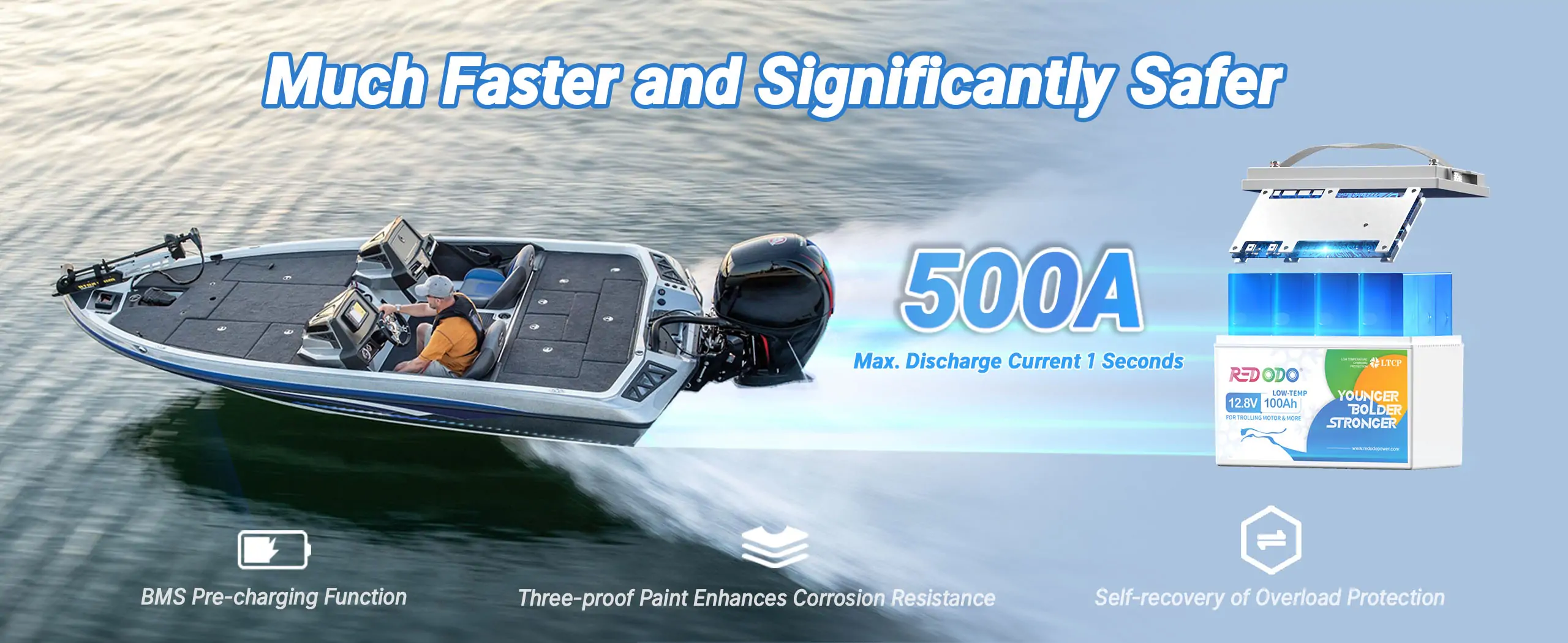
Check out Redodo deep cycle marine battery.
Key Takeaways
- Choosing the right marine battery group size is essential to ensure a proper fit and to meet your power needs.
- Understanding these sizes helps you select a battery that delivers optimal performance, capacity, and cranking amps for your marine applications.
- The marine battery size chart provides an overview of BCI group sizes, assisting in making informed choices. Generally, larger group sizes indicate higher battery capacity, regardless of the battery type.
- Regular maintenance and inspection are crucial for ensuring reliable power and extending the battery's lifespan.
What Does Group Size Mean?
Group size serves as a uniform categorization system indicating a battery's physical dimensions and terminal placement, thereby dictating its suitability for particular vehicles or machinery. This standardized code, upheld by entities such as the Battery Council International (BCI) for automotive and marine batteries, guarantees compatibility and interchangeability across batteries produced by diverse manufacturers. Grasping the concept of battery group sizes is essential for pinpointing the ideal battery to energize a myriad of devices.
The Difference Between A Regular Battery and A Marine Battery
Marine batteries are equipped with thicker internal lead plates compared to car batteries, enabling them to discharge energy gradually over extended durations. This feature is for deep cycle battery, which is different from the starting battery. Additionally, their housings are generally larger than those of equivalent car batteries, incorporating additional plastic shielding. This added protection is necessary due to the rougher conditions encountered in boating environments, which differ significantly from the smoother surfaces of on-road driving.
Battery Group Size Chart
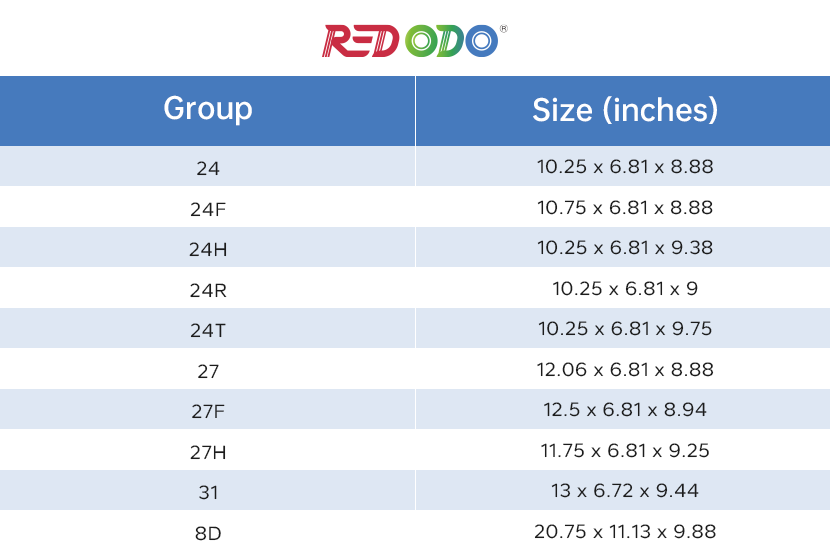
Group 24 Battery Vs Group 27 Battery
1. What is a Group 24 battery and a Group 27 battery?
The Group 24 battery is a common standard model, measuring 10.5 inches in length, 6.1875 inches in width, and 8.875 inches in height. This specific size battery is frequently encountered in vehicles, backup power systems, and medical equipment. Typically, Group 24 batteries are employed as deep cycle batteries rather than for engine starting purposes.
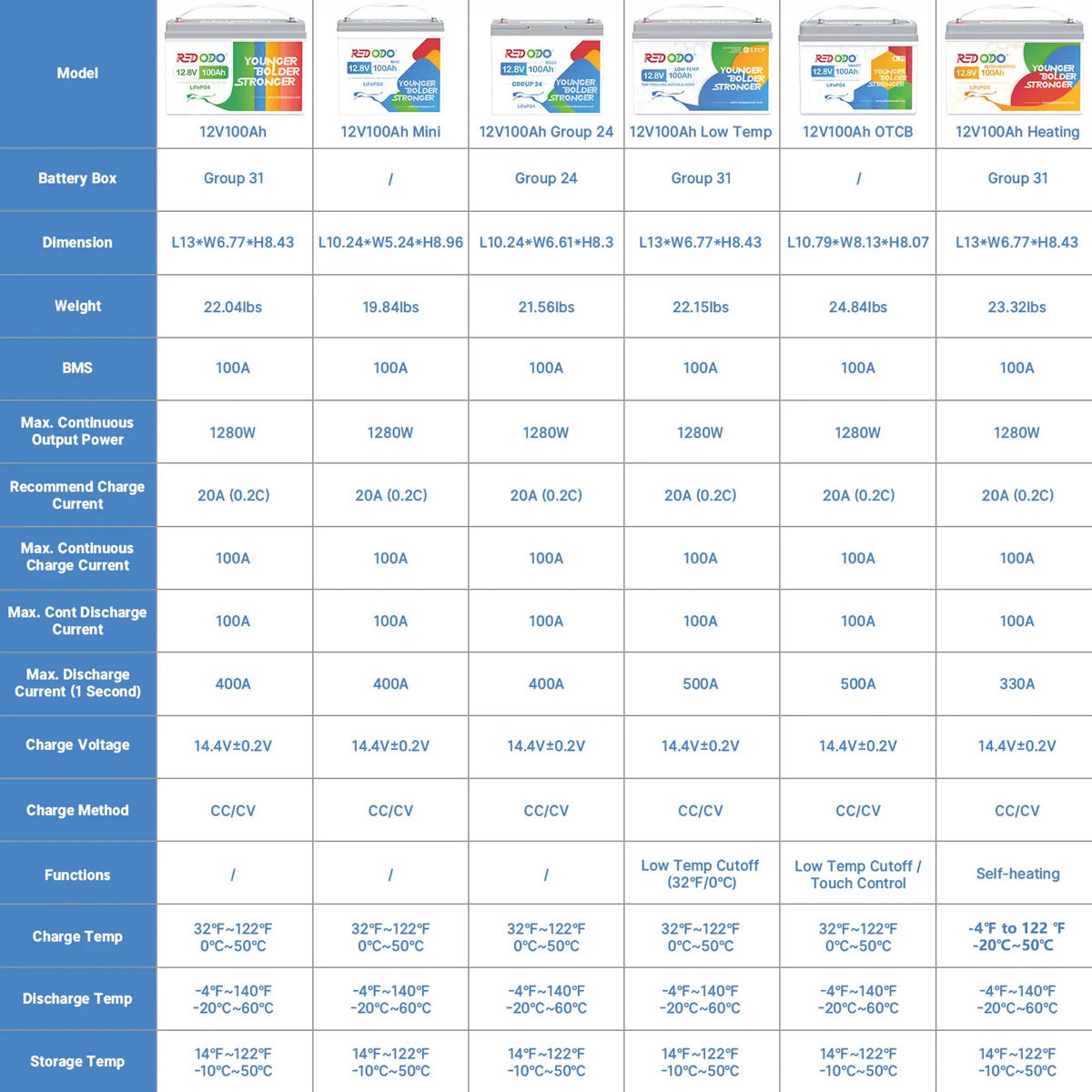
On the other hand, the Group 27 battery is also a standard model, measuring 12.5 inches in length, 6.75 inches in width, and 9.37 inches in height. This battery size finds widespread use in automotive, marine, off-the-grid, RVs, and similar applications, including backup power systems. Compared to the Group 24 battery, the Group 27 battery is larger in size.
2. Comparison between group 24 battery Vs group 27 battery
(1)Chemistry
Regardless of whether it's Group 24 batteries or Group 27 batteries, the most prevalent BCI Group battery chemistries include Flooded Lead Acid (FLA) and Sealed Lead Acid (SLA).
- AGM Absorbent Glass Mat (AGM) Batteries
- Sealed Lead Acid (SLA) Batteries
- Gel-cell batteries
- Flooded batteries
- Lithium ion batteries
Lead-acid batteries stand out as the most economical option among them. However, lithium batteries offer a prolonged cycle life and have garnered significant interest due to their eco-friendly nature and recyclability. If you're considering purchasing lithium batteries in group sizes, you can explore our selection of Redodo lithium batteries.
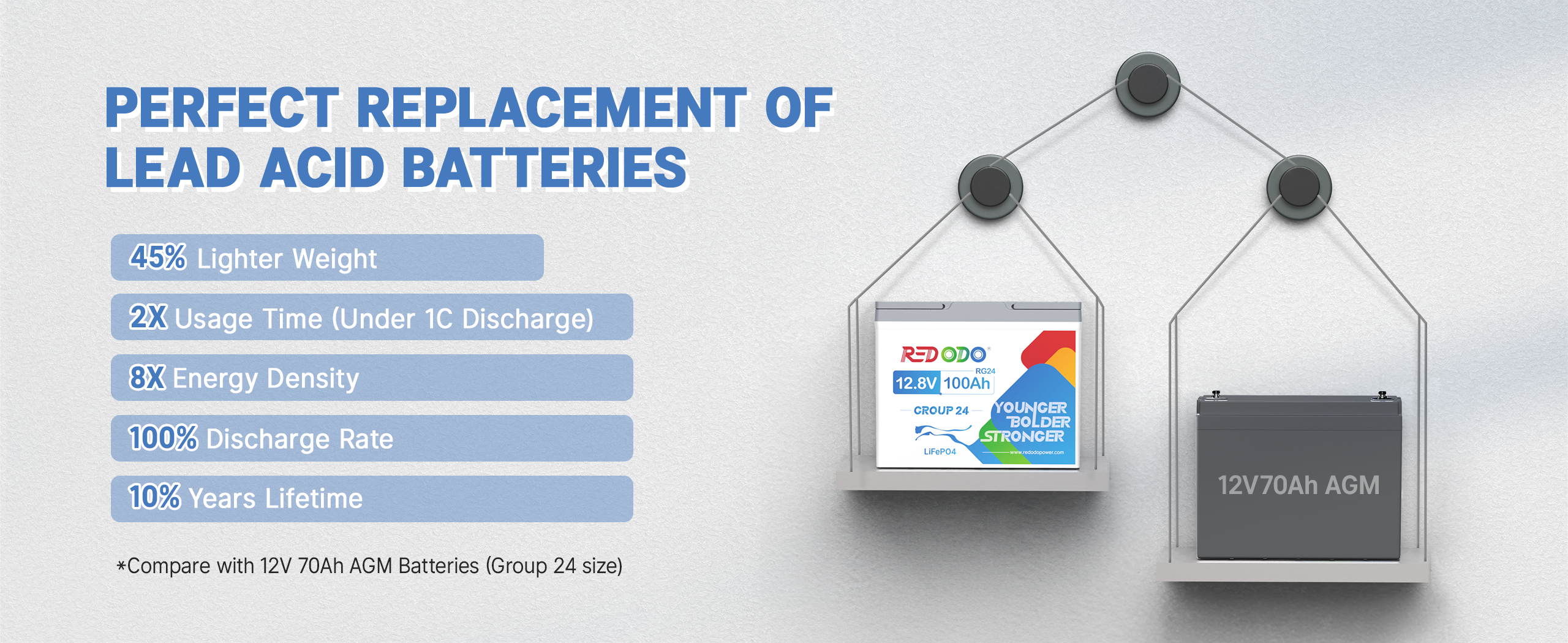
(2)Dimension
Group 24 batteries feature standard group dimensions of 10.25 x 6.8125 x 8.875 inches or 260 x 173 x 225 mm, while Group 27 batteries measure 12.0625 x 6.8125 x 8.875 inches or 306 x 173 x 225 mm.
Interestingly, they share identical width (6.8125 inches or 173 mm) and height (8.875 inches or 225 mm), but differ in length.
Based on this information, it's evident that battery compartments designed for Group 24 batteries typically cannot accommodate Group 27 batteries. However, compartments intended for Group 27 batteries may accommodate Group 24 batteries.
(3)Capacity
In contrast to the Group 24 battery, Group 27 batteries typically offer slightly higher capacities.
(4)Application
Generally, the applications of Group 24 batteries include:
- Backup storage systems
- Large UPS systems
- Wheelchairs
- Medical and security systems
- Industrial applications
Deep cycle group 24 battery such as Redodo Group 24 lithium battery is pgraded to downsize for seamless compatibility with BCI Group 24 Size, this battery is 25% smaller than the Redodo 12V 100Ah LiFePO4 Battery Group 31, making it well-suited for various motorhome battery casings such as Group 24/27/31 battery boxes. Despite the size reduction, the energy remains unchanged at 1.28kWh, increasing the energy density by over 40%. Compact yet powerful, it fuels your energy needs, enhancing your lifestyle on the go.
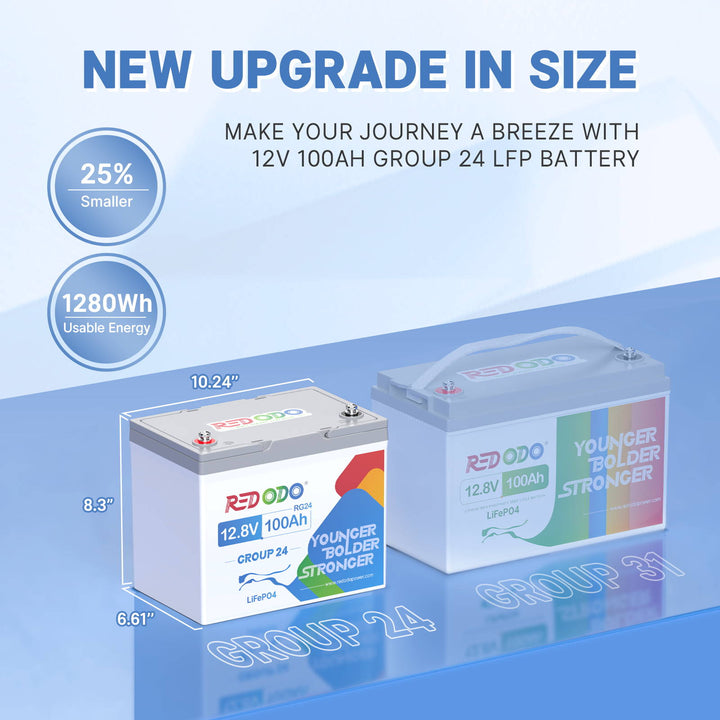
Conversely, Group 27 batteries find applications in off-grid setups, RVs, automotive, marine, and similar scenarios.
Are Group 27 and 31 Batteries the Same Size?
A Group 31 marine battery surpasses the dimensions of a Group 27, measuring 12.8 inches in length, 6.8 inches in width, and 9.3 inches in height. This slight enlargement accommodates greater power storage capacity, rendering it an optimal selection for boats equipped with elaborate electronic systems and as house batteries in RVs and solar power installations.
AGM Group 24 Battery vs Lithium Group 24 Battery
1. Drawbacks of AGM Group 24 Battery:
- Sensitive to Overcharging: AGM batteries are sensitive to overcharging, which can lead to reduced lifespan and potential damage if not properly regulated by a suitable charging system.
- Limited Deep Discharge Capability: While AGM batteries are designed to handle deep discharges better than traditional flooded batteries, they still have limitations in terms of depth of discharge compared to other types of deep cycle batteries like lithium-ion.
- Temperature Sensitivity: AGM batteries can be sensitive to temperature extremes. High temperatures can accelerate aging and reduce lifespan, while very low temperatures can decrease performance and capacity.
- Weight: AGM batteries tend to be heavier than flooded lead-acid batteries of similar capacity, which can be a concern for applications where weight is a critical factor, such as in marine or RV use.
- Maintenance Requirements: While AGM batteries require less maintenance compared to flooded lead-acid batteries, they still require periodic maintenance to ensure optimal performance and lifespan, such as regular charging and occasional equalization.
- Limited Availability: Depending on your location, AGM Group 24 batteries might not be as widely available as other types of batteries, which can make replacement or sourcing spares more challenging.
2. Advantages of Group 24 Lithium Battery:
- High Energy Density: Lithium batteries offer significantly higher energy density compared to traditional lead-acid batteries, allowing them to provide more power in a smaller and lighter package. The energy density of lithium battery is 61Wh/lbs, AGM battery is 52Wh/lbs.
- Longer Lifespan: Lithium batteries have a longer lifespan than lead-acid batteries, with many lithium batteries rated for thousands of charge cycles, providing reliable power over an extended period. For example, Redodo Group 24 battery has 4000-15000 life cycles, which can be used for 10+ years. AGM battery has only 200-500 cycles.
- Fast Charging: Lithium batteries can be charged much more quickly than lead-acid batteries, allowing for shorter charging times and quicker turnaround between uses. Under the same premise of deep discharge, lithium battery charging time is 5 hours, AGM battery charging times is more than 8 hours.
- Deep Discharge Capability: Lithium batteries can be discharged to much lower levels without causing damage, providing more usable capacity and flexibility in power usage.
- Maintenance-Free: Lithium batteries require minimal maintenance compared to lead-acid batteries, eliminating the need for regular watering, cleaning, or equalization.
- Lightweight: Lithium batteries are significantly lighter than lead-acid batteries of similar capacity, making them ideal for applications where weight is a concern, such as in marine or RV use. Redodo 12V 100Ah group 24 batteries weigh only 21.6lbs, 2/3 lighter than the weight of 12V 100Ah AGM battery (63.9lbs).
- Temperature Tolerance: Lithium batteries perform well across a wide range of temperatures, making them suitable for use in extreme environments without significant loss of performance.
- Efficiency: Lithium batteries have high charge and discharge efficiency, meaning less energy is lost as heat during charging and discharging processes, resulting in more efficient use of stored energy.
- Low Self-Discharge: Lithium batteries have a very low self-discharge rate, allowing them to hold their charge for longer periods when not in use compared to lead-acid batteries.
- Compatibility with Renewable Energy Sources: Lithium batteries are well-suited for use with renewable energy sources such as solar or wind power due to their ability to store energy efficiently and effectively.
| Feature | AGM Battery | Lithium Battery |
|---|---|---|
| Energy Density (Wh/lbs) | 52 | 61 |
| Lifespan (Cycles) | 200-500 | 4000-15000 |
| Charging Time (under deep discharge) | More than 8 hours | 5 hours |
| Deep Discharge Capability | Limited, more prone to damage | High, less prone to damage |
| Maintenance-Free | Requires regular watering, cleaning, equalization | Requires minimal maintenance |
| Weight of 12V 100Ah group 24 batteries (lbs) | 63.9 | 21.6 |
| Temperature Tolerance | Significant performance loss in extreme environments | Performs well across a wide temperature range |
| Efficiency | Lower charge and discharge efficiency, significant energy loss | High charge and discharge efficiency, minimal energy loss |
| Low Self-Discharge | Relatively higher self-discharge rate, faster discharge when stored for extended periods | Very low self-discharge rate, holds charge for longer periods |
| Compatibility with Renewable Energy Sources | A reliable choice for pairing with solar panel systems In some cases | Suitable for use with renewable energy sources such as solar or wind power |
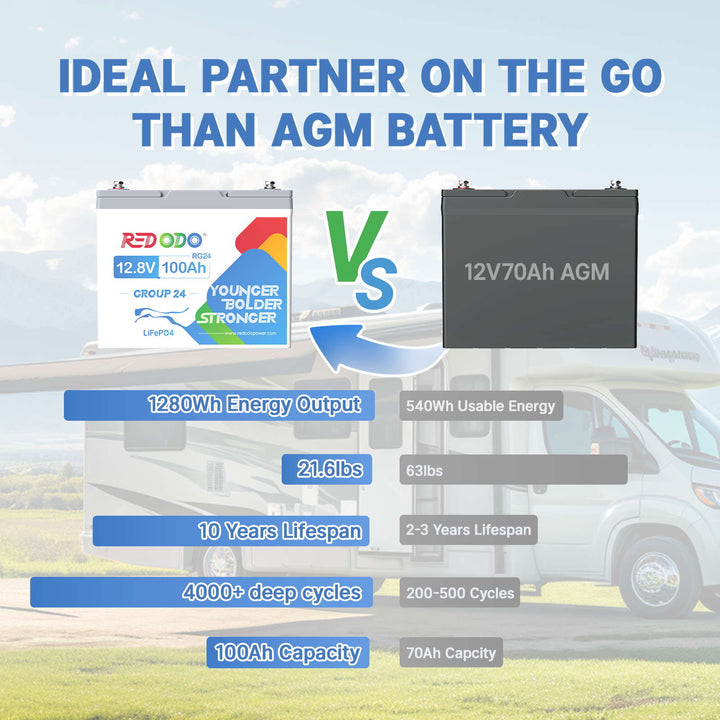
These advantages make Group 24 lithium batteries a popular choice for various applications, including marine, RV, off-grid solar systems, and electric vehicles.

In summary, lithium batteries have become the first choice of many consumers as a more environmentally friendly battery. REDODO's lithium battery products are currently on hot promotion, don't miss the deals!
FAQs about Marine Battery Group
1. What group is a marine battery?While the BCI group size spectrum spans various sectors like passenger cars, electric vehicles, and commercial batteries, our discussion today centers on sizes predominantly employed in marine applications. These encompass batteries categorized under Group 24, Group 27, Group 31, and 8D.
2. What is the difference between Group 31 and Group 34 marine batteries?The Group 34 marine battery extends slightly beyond the dimensions of the Group 31. Its measurements are 13.5 inches in length, 6.8 inches in width, and 9.3 inches in height.
3. What kinds of Marine batteriesare there?
There are four chemical types of marine batteries tailored for diverse applications: flooded, gel, Absorbed Glass Mat (AGM) and lithium.
Conclusion
Marine batteries come in many varieties, with three battery sizes available to the marine industry: 24, 27 and 31. We recommend considering the size of the cabin before deciding on the battery size to purchase. What is suitable is the best. What's important, you can upgrade AGM group 24 battery to lithium group 24 battery to enjoy the benefits!

Redodo

Redodo
Recent Post

How Long will A 100Ah Battery Run An Air Conditioner?

A Full Review of Redodo 12V 140Ah Group 31 Deep Cycle Battery

How Much Does it Cost to Replace Golf Cart Batteries?

What Size Fish Finder Battery Do I Need? 2025 Updated

![⚡[$165 after Sign-Up] Redodo 12V 50Ah Bluetooth Battery for Trolling Motors (Up to 70lb Thrust)](http://www.redodopower.com/cdn/shop/files/12v50Ahlithiumbattery0.webp?v=1741251960)
![⚡[$165 after Sign-Up] Redodo 12V 100Ah Lithium Trolling Motor Battery With Low Temp Protection](http://www.redodopower.com/cdn/shop/files/Redodo12V100Ahlow-tempbattery.webp?v=1738462317)
![⚡[$179 after Sign-Up] Redodo 12V 100Ah Bluetooth Marine Battery | For Marine, Trolling Motors, RV](http://www.redodopower.com/cdn/shop/files/5s5p_58b30e00-41f5-4642-acb1-954626d7c92f.jpg?v=1742972693)
![⚡[$174 after Sign-Up] 12V 20Ah LiFePO4 Marine Cranking Battery, 800CCA(-10℃)](http://www.redodopower.com/cdn/shop/files/Redodo_12V_20ah_cranking_lithium_battery.jpg?v=1742812419)
![⚡[$460 after Sign-Up] Redodo 12V 140Ah Dual Purpose Marine Battery, 1000 CCA](http://www.redodopower.com/cdn/shop/files/Redodo-12V-140Ah-cranking-battery.jpg?v=1742812553)
![⚡[$184 after Sign-Up] Redodo 12V 100Ah Group 24 Bluetooth LiFePO4 Battery | Real-Time Battery Monitoring | For RV, Marine, Solar](http://www.redodopower.com/cdn/shop/files/group_24_BT_312a5c81-ec74-4307-a7f5-c05e195d5246.jpg?v=1742971855)
![⚡[$184 after Sign-Up] Redodo 12V 100Ah Group 31 Bluetooth Lithium Battery | Real-Time Battery Monitoring | For RV, Marine, Solar](http://www.redodopower.com/cdn/shop/files/GROUP_31_0501cb0c-ed50-4c4a-b78e-b7ab501d90b4.jpg?v=1742971970)
![⚡[$198 after Sign-Up] Redodo 12V 100Ah Mini Lithium LiFePO4 Battery | Smallest Battery | For RV, Trolling Motor, Solar](http://www.redodopower.com/cdn/shop/files/Redodo12V100AhMiniLiFePO4LithiumBattery.jpg?v=1739959054)
![⚡[$450 after Sign-Up] Redodo 12V 280Ah LiFePO4 Battery | Low Temp Protection | For RV, Marine, Solar](http://www.redodopower.com/cdn/shop/files/Redodo12V280AhLowTempCutoffLiFePO4Battery.jpg?v=1741251504)